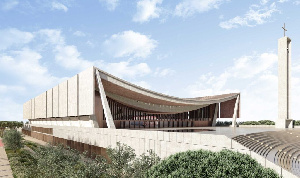Member of Parliament for North Tongu, Samuel Okudzeto Ablakwa, has released a report that the government of Ghana paid a consultant over GH¢28 million for the organisation of a fundraiser in support of the construction of a National Cathedral.
According to the opposition MP, the state despite paying such an amount to the consultant realised only GH¢794,990 after the fundraiser was held in the United States of America.
“Latest Cathedral documents I am analyzing expose a shocking payment of an unbelievable GH¢28.2million (GH¢28,244,716.97) from Ghanaian taxpayer funds to one Mr. Cary Summers, an American President & CEO of the Nehemiah Group.
“Mr Cary Summers is described on the website of President Akufo-Addo’s Cathedral as a ‘Consultant for the United States.’
“Curiously, after receiving our GH¢28.2million, he spearheaded a US fundraising event for the Ghanaian government & Cathedral Secretariat which raised only a paltry GH¢794,990.01,” Mr Ablakwa said in a Facebook post.
Describing the incident as a “classical case of causing financial loss to the state,” Mr Ablakwa said the payment could be seen as an act of generosity or wastefulness.
“Only the Ghanaian government pays GH¢28.2 million for less than GH¢800,000 — which is all Cary Summers has raised for Ghana in three long years. A classical case of causing financial loss to the state.
“The Ghanaian government must be either the most generous or the most wasteful government in world history. When advocates of this scandalous cathedral project tell us it’s been such a blessing, we now understand exactly what they mean,” he added.
Samuel Ablakwa has been a fierce critic of the National Cathedral project which is bedevilled with several controversies surrounding its funding.
The project which is estimated to cost some $400 million according to the government will see the invested money recouped by serving as a tourist attraction.
However, critics citing the disbursement of state funds towards the construction have questioned the priority given to the project under the current economic circumstance.
Source: ghanaweb.com




